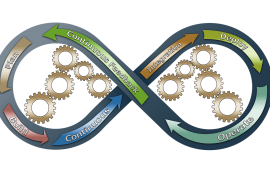What is an ERP system?
Enterprise Resource Planning
In the simplest words, ERP is the integration of core processes of a company like HR, supply chain, services, procurement, management, finance, customer management, etc.
But is it this simple as it is written? No.
Now ERP systems use technologies like AI to attain visibility, efficiency, intelligence across every aspect of a business.
EPR helps in predictive analytics, automating processes, support real-time decision making, and artificial intelligence.
Every business has its own objectives, short term goals, long term goals, targets, aims, requirements, and also some processes to achieve those aims. But today’s working fashion requires technologies with functions that not only make the processes easier but makes it more inclusive with business people.
When does a company need an ERP system?
Yes. It’s a matter of when more than why or if. With the growth of the company its database and sources also grow. And it becomes quite difficult and costly to manage all that information on multiple platforms and leads to mismanagement.
So, how to identify that your business is in need of an ERP system?
Look for the following signs.
- Lack of proper communication– lack of communication between processes that are co-dependent will lead to unwanted surpluses and shortages. Such inefficiencies can result in production derail, throe off of timelines, and can disrupt the company’s baseline.
- The major part of the time is consumed by paperwork.
- You have outgrown the current software your company is using. – the entry-level software can only hold a limited amount of data that you feel the need for a more robust system for heavy data processing.
- Your existing process is proving inefficient– Losing track of documents while switching between apps or trouble in communication between apps are some of the main reasons to switch to ERP.
- Too much expenditure on software integration– Without an ERP it is highly possible that your company is running various software integrations to manage data and interdepartmental exchange of data. But it is not a cheap process. It takes a lot of work , formalities, and training to get so many applications to work in a synchronized manner.
- You are struggling to meet customer demands– Difficulty in keeping track of inventory, retrieving customer financial information, producing reports, etc. can be managed by ERP.
Why use an ERP?
-
Automation of processes
It helps companies in the actual process of automation, manages tasks so employees can focus on more logical and critical points.
It boosts productivity and reduces expenses on other operational costs. It gives a push to workflow execution and communication.
-
Financial Management
What can be a better way to grow your business than tracking the finances flow? And this can be totally achieved by having a good ERP system for an organization that helps in all the finance works like accounting requirements, budgeting, expenses dealing, looking at collections, managing assets, overseeing cash flow, and recording other transactions. An ERP System is the one that keeps your business’s financial information secure and complaint.
We at Adqnix Techlab Pvt. Ltd. master at making the best ERP Systems that are sturdily inclined to manage your company’s financial data and keep it safe especially today, in the times of data breaches.
-
Increases efficiency
Gives operational accuracy, reduces manual error induced work. Saves time and money. Automation of critical activities increases the business processes efficiency. Different departments work in synch with the help of ERP.
-
Communication is smooth and efficient
Communication, either between internal business resources or interaction of suppliers and customers is important and needs to be clean and easy. All this is enhanced by ERP.
ERP handles real-time communication and responds very well with coordination.
-
Project Management
An ERP system helps the business to get a real-time and accurate overview of the product lifecycle regarding the production, delivery, quotations issues, invoicing, and till collection, everything can be overviewed using a good ERP System. This helps businesses in having a clearer view of their supply chain as well as an eye on their day-to-day production.
Not just that, an ERP System also offers businesses to manage three multiple projects at a time. An organization can monitor the process and progress of multiple projects running at the same time using ERP and have an idea about at what stage a particular project is and what are the future decisions that can be taken for the growth of projects.
-
Information management
Organizations have information and data all across the inter departments which if are not synched can cause a lot of trouble for not only employees but customers. It can lead to chaos between customers and companies because the company is not having organized information to satisfy customers. ERP makes the process of transactions, accounting, finances faster, frictionless and accurate.
Benefits of ERP System for an organization
The benefits of ERP are infinite for an organization. But to boiling down all of them into 2 key elements can be
- ERP helps in enhancing business efficiency
- ERP also helps in making an efficient business decision
- ERP software can store large amounts of data. All the operations like accounting, HR, CRM, etc can be easily managed by ERP.
- ERP increases productivity by streamlining and automating core business processes.
- ERP gains fast answers, and eliminate information silos.
- Transparency is the base of any business and ERP helps you in knowing about what operations are going on in each department. Then it becomes quite easy to do things more efficiently.
- ERP accelerates reporting by fast-tracking the financial reports and share insights in real-time.
- It increases business visibility and gives control and compliance.
- Simplifies the database and gives every employee an easier way to work.
- Give access to real-time data to identify and solve issues.
- ERP integrates functions seamlessly and disparate operations for the central workspace.
- Reduces the risk of errors in data entry as information is only stored once.
- ERP reduces training costs, expenses, and user error.
- ERP consolidates data from CRM, management, shipping, and other departments into a single easy to navigate dashboard.
- EPR performs an audit on your current processing system to look for improvement in workflow.
ERP is definitely vital of the need for growing business and Adqnix Techlab can help you to invest in the right ERP for your company according to your requirements and future needs.




Comments are closed.